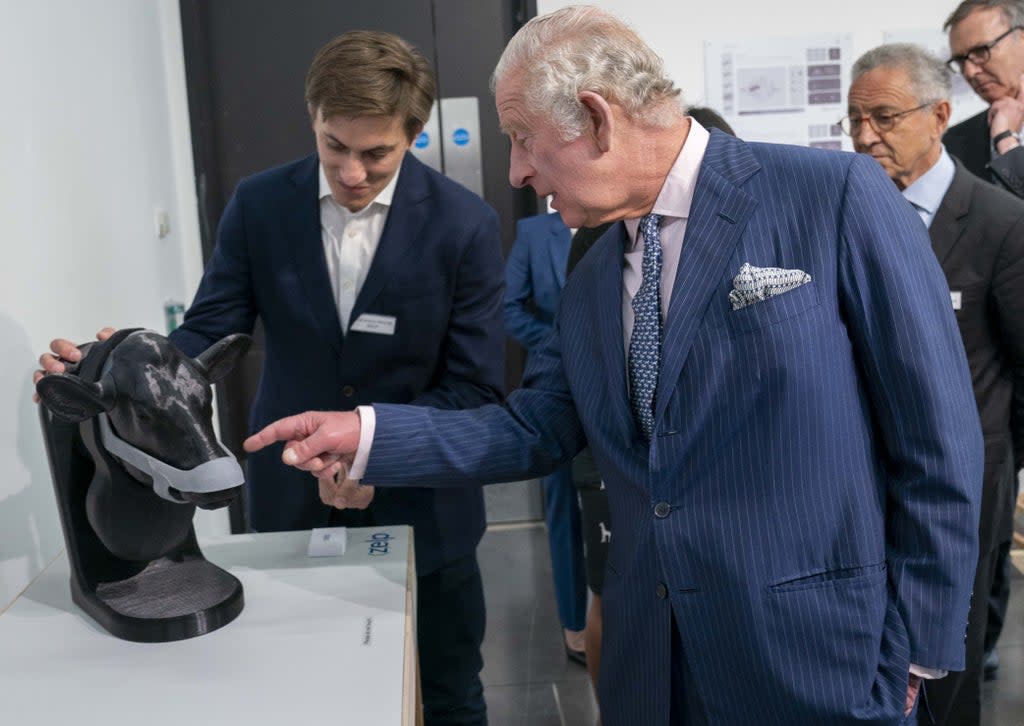Prince Charles intrigued by a new face mask for burping cows to cut methane emissions

Prince Charles was intrigued by a new face mask for burping cows that has already been proved to cut their methane emissions by more than half.
Charles encountered the ‘Zelp’ device, which has been designed to combat emissions from the world’s 1.6 billion cattle - one of the single biggest causes of global warming - when he visited the Royal College of Art, of which he is patron, on Wednesday.
Cattle produce two gigatonnes of carbon dioxide equivalent emissions a year.
Thanks to a new competition for students past and present - The Terra Carta Design Lab - by his Sustainable Markets Initiative, there is now a wearable device for cattle to neutralise methane emissions in real time.
The heir to the throne toured an exhibition showcasing its 20 finalists and met with the winners who have all developed ingenious solutions to tackle the climate crisis.
Francisco Norris devised the bovine face mask and explained to the prince how the Zelp - Zero Emissions Livestock Project - was using its cattle harnesses to neutralise methane, improve animal welfare and get organisations closer to net zero.
The device fits comfortably around the animal’s head and does not interfere with its day to day activities.
As the cattle exhales, methane travels through a catalyst where it is oxidised and then released into the atmosphere as CO2 and water vapour instead of harmful greenhouse gas.
”It doesn’t stop them breathing?” The fascinated prince, who is a farmer himself as well as an environmentalist, asked.
“No, it just sits on top,” Mr Norris explained.
He told Charles that research has shown that not only does the harness not affect their breathing or eating but their milk production, which is tested twice daily, doesn’t slow down either.
Tests have already proven that wearing the harness ensures a 53 per cent reduction in methane and the firm is working to 60 per cent next year.
“And it reduced the methane produced by their belching,” Charles said.
Zelp said, contrary to common belief, around 95% of the methane from cattle is expelled via exhalations and belching of cows - not farts.
It said “neutralising methane emissions is the single fastest way to stop climate change”.
Mr Norris told the royal that commercial production is due to begin in 2023.
Charles also talked at length to Hanson Cheng from The Tyre Collective.
His group are developing a device to fit on tyres that collect expelled piece of tyre from wear and tear. Tyre wear is the second largest microplastic pollutant in our environment.
The device can be fitted on a tyre and collects the pieces of micro plastics that are charged with fraction from the road.
Charles marvelled at a box of tyre pieces collected from a single London bus in the course of a day and wish the group luck as they told him they are looking to work with different tyre companies and car manufacturers.
“It’s about trying to get the virtuous circle that nature does so well,” he remarked.
Each winner receive £50k funding and mentoring from Sir Jony Ive, the former chief design officer at Apple and now chancellor of the RCA, and the corporate members of the prince’s SMI network.
Other winners included Ampitex, a 100 per cent recyclable waterproof breathable textile free of harmful chemicals.
The prince said: “I can’t tell you how proud I am to be associated with the Royal College of Art, particularly as a result of seeing the remarkable ideas presented by many of them alumni and existing students. May I say that it is critical because of the urgency we face in terms of the crisis confronting us in all directions and just how important is what their ideas represent in terms of finding solutions rapidly.
“I can only hope as a result of this and drawing a built more attention to what you are doing that we will have a better chance of winning this battle in shorter time. I can only wish you every possible success. Many congratulations, marvellous.”
Inspired by the Terra Carta - Charles’ Magna Carta-style pledge to save the planet.
The prince and Sir Jony Ive launched the Terra Carta Design Lab with the Royal College of Art as part of HRH The Prince of Wales’s Sustainable Markets Initiative.
The Terra Carta Design Lab aims to highlight the urgent need to focus on the creative collaboration between art, science, design, and engineering to produce credible and sustainable solutions to the climate crisis.
The RCA was named the world’s leading university of art and design in the QS World Rankings 2022 for the eighth consecutive year.
Speaking afterwards, Sir Jony said: ‘The entrants had such a clear and acute sensitivity for the problems they were tackling. Given how enormous the challenge is, the prince of Wales also has a particular understanding that is encouraging and optimistic. He thinks there is a very positive reason to engage.’


